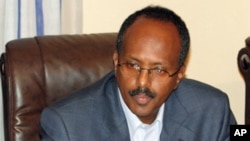Somalia's newly-appointed prime minister is scheduled to appear before parliament in a confirmation hearing. The nomination of Mohamed Abdullahi Mohamed as prime minister has sparked deep concern from some U.S.-based analysts, who say he is not qualified to tackle Somalia's myriad problems.
Last Thursday, Somali President Sharif Sheik Ahmed announced the appointment of a relatively obscure member of the Somali Diaspora to replace Omar Abdirashid Ali Sharmarke, who stepped down as prime minister last month.
President Sharif said he nominated Mohamed Abdullahi Mohamed, also known as "Farmajo," as prime minister, noting his previous experience as a diplomat during the 1980s under the regime of Mohamed Siad Barre. The president said he was confident the most qualified man has been chosen for the job.
The Senior Vice President of the National Committee on American Foreign Policy, J. Peter Pham, says he believes President Sharif has picked a man, who brings too little too late to a U.N.-backed government that has long suffered crippling internal divisions and remains deeply unpopular among the Somali people.
Since the current government was formed in 2004, it has had two presidents and three prime ministers, who have all been unable to stand up a functioning central administration during their time in office.
"If you are going to shore up the Transitional Federal Government, you need a prime minister who brings something to the table," Pham said. "In Somalia, political legitimacy comes in two ways - either through having a military force behind you or having a very strong clan and other affinities. And it is not evident to me that the new prime minister has either."
Like former prime ministers Nur Hassan Hussein and Sharmarke, Farmajo's background and resume reflect close ties to the international donor community that supports the Transitional Federal Government.
Hussein, also known as Nur Adde, was the Secretary General of Somalia's Red Crescent Society and was based in neighboring Kenya when he was nominated by former President Abdullahi Yusuf in 2007. Sharmarke, who became prime minister in the Sharif government in February 2009 and was ousted last month, was a Canadian-Somali, who once worked as a diplomat for the United Nations.
Farmajo's ties are to the United States, which began after he left Somalia in the mid-1980s to take up the post of first secretary in the Somali embassy in Washington. He eventually became a U.S. citizen. In recent years, he worked as a civil servant for the state of New York, and taught college courses in leadership skills and conflict resolution.
The newly appointed prime minister has acknowledged visiting Somalia only once in the past 25 years.
Analyst Michael Weinstein at Purdue University in the United States says he believes Farmajo's nomination was unduly influenced by western donor nations, who are putting their need to have a friendly partner in the transitional government ahead of Somalia's need to find a leader with broad popular support.
"You got Sharmarke pushed out and now you have Mohamed in there," Weinstein said. "What is he? Another figure of the international coalition. He is the same type as Nur Adde, Sharmarke. The nice way of saying it is, 'He has no political baggage.' That means he has no support base."
Farmajo is also a member of the Marehan sub-clan of the Darod tribe - a membership that Pham and Weinstein say could further test the transitional government's fragile relationship with Somalia's northern semi-autonomous region of Puntland.
Puntlanders consider the Marehan as a southern-based clan.
The Puntland minister of state planning and international cooperation, Abdulkadir Abdi Hashi, has already complained that if Farmajo becomes prime minister, the three highest offices in the Transitional Federal Government - the president, the prime minister, and the speaker of parliament - will be occupied by southerners in violation of the traditional national consensus.
Pham says the leadership in Puntland may declare independence if it feels the northern region is being politically marginalized by the government in Mogadishu.
"They are feeling alienated. So, I think it is certainly going to not make it any easier to keep Puntland in," Pham said.
Analysts say any sign of renewed discord in the Transitional Federal Government could also give fresh momentum to al-Shabab militant group, which has reportedly been weakened by clan-based squabbling among its leaders in recent weeks.
Somalia's New Prime Minister Under Scrutiny




